There are different cost components of car usage and one of the most important things to consider is fuel consumption. Our final mileage per gallon could be determined by driveline efficiency, engine size, rolling resistance and overall weight, including passengers and other things. Often, we should be able to save a lot of money by choosing smaller four cylinder car than a huge SUV with V8 engine. Regardless the type of our car, we should know that there are other factors that could make our car much more efficient. As an example, by taking care of our tires we should be able to reduce overall fuel usages.
We should check the pressure of the tires when they are cold. Even driving for only one mile will raise the pressure of the car. To get the most accurate reading, we should wait for about one hour after the car was driven. There are tire pressure gauges available in many auto parts stores. This should allow us to measure the tire pressure in the morning when our car is still cool. We should know about the amount of air in our tires. Based on our readings, we should be able to add more air pressure to the tire. Once we do that, we should check the pressure in the following morning, to make sure that we have enough pressure inside our tires.
Car pressure should match the specification for our car. We should be able to find this information in our owner’s manual. The tire pressure should also be listed on the placard of our car, such as in the glove box or the door pillar on the driver’s side. We should pay a visit to our local garage if we have problem finding it. Our car dealer should also be happy to show us. We should know that tires lose air pressure over time, so it is a good idea to check the pressure of our tires each week. For many reasons, nitrogen is increasingly popular for use in our tires. It is often said that nitrogen could increase gas mileage.
We should be able to reduce fuel usages by not carrying excess weight. Some cars are so packed with stuff that there’s barely enough room for a few extra passengers. Our engine will require more energy when the overall weight of the car is higher. To get our car moving from zero to specific velocity could require more energy and also more fuel. This is something that we want to avoid when we plan to improve our car mileage. The car burns more fuel when we put pressure on the accelerator pedal and we will need to push the pedal deeper if our car is heavier than usual.When using automatic transmission cars, many drivers habitually put their left feet on the brake pedal. We may unintentionally engage the brake slightly, increasing tire resistance and reducing fuel mileage.























